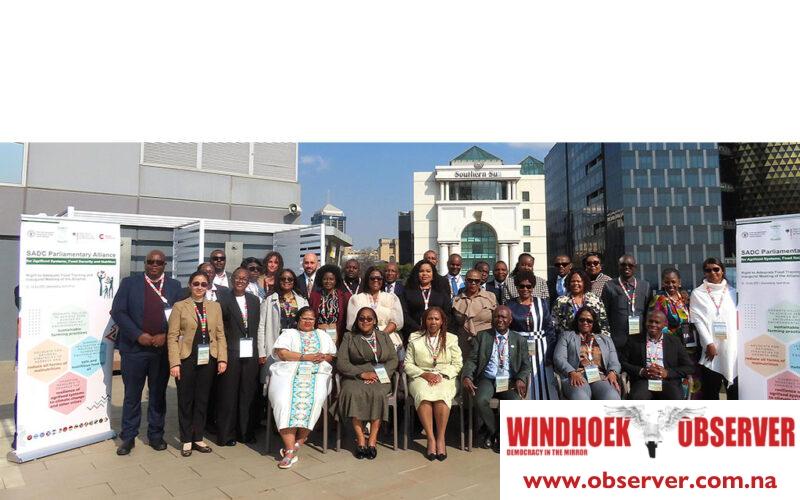Moses Magadza and Angel Alessandri
The inaugural meeting of the SADC Parliamentary Alliance on Agrifood Systems, Food Security and Nutrition, began in Johannesburg on 22 July 2025, with the SADC Parliamentary Forum and the Food and Agriculture Organisation of the United Nations (FAO) calling for stronger parliamentary action to combat hunger, malnutrition, and build resilient agrifood systems across Southern Africa.
Speaking to lawmakers from different SADC Member States, development partners, and technical experts, SADC PF Secretary General Ms Boemo Sekgoma noted that the meeting came at a time of global food crises exacerbated by conflict, climate change, and inequality.
“As we speak,” she said, “thousands of individuals, including women and children, are deprived of nutrition in the Middle East due to armed conflicts. The situation is no better in Africa, where protracted droughts and hotter summers have rendered food scarce, unavailable, or simply unaffordable in certain areas.”
She stated that hunger was not merely a biological state but a structural injustice.
“These children are not lazy. They are hungry. And hunger does not merely gnaw at the stomach. It gnaws at dreams, at potential, at futures,” Sekgoma stated, referring to reports from one member state where rural teachers keep food diaries to track what their students are not eating.
The secretary general advocated for treating food not as a private matter but as a “parliamentary concern, a human right, and a legal obligation.”
She called on Parliaments across the region to adopt robust legislative and oversight mechanisms to advance food justice.
Citing international standards such as General Comment 12 on the Right to Adequate Food by the UN Committee on Economic, Social and Cultural Rights, Ms Sekgoma stressed that availability, accessibility, and cultural appropriateness are indispensable to fulfilling this right.
She pointed to the paradox of global food systems where, amid widespread hunger, 2025 has recorded over 3,000 billionaires, a reflection of growing inequality.
“Does capitalism always serve the cause of malnutrition and food insecurity in the world? Or would a measure of socialism be better for food security?” she asked.
She challenged the audience to reflect on the role of state intervention in guaranteeing the right to food.
The SG called on lawmakers to leverage their legislative powers to promote agricultural productivity, remove tariffs on staple foods, support smallholder farmers, and provide social safety nets during emergencies.
“Parliamentary activity can enhance agro-business schemes, remove value-added taxes on rice and cereals, and oversee safe pest control methods,” she said, adding that remunerative employment laws must also be part of the solution to food insecurity.
She reaffirmed the SADC PF’s commitment to human rights as enshrined in its 2024–2028 Strategic Plan, and urged members of the Alliance to align their work with the SADC Vision 2050 and the African Union Agenda 2063.
“If we are to build the coveted SADC of tomorrow… our citizens must be safe from food insecurity. Their rights to food must be implemented to their fullest extent,” she said.
Sekgoma quoted Greek dramatist Euripides: “If a man’s stomach is full, it makes no difference if he is rich or poor.”
Speaking at the same occasion, Dr Babagana Ahmadu, the FAO representative in South Africa, hailed the partnership between FAO and SADC PF as “pivotal” in achieving food security and transforming food systems in the region.
He urged lawmakers to treat the right to adequate food as a fundamental human right and a political imperative.
“This gathering is particularly timely, marking a significant milestone in our collective efforts to address hunger, malnutrition, and the sustainability challenges within our region,” said Dr Ahmadu.
He stressed the role of parliamentarians as agents of change and said their legislative, budgetary and oversight mandates are essential to ensuring the right to food is realised for all citizens.
The meeting comes as the region prepares to host the Global Parliamentary Summit against Hunger and Malnutrition in 2026, a landmark event that Dr Ahmadu said would benefit from the momentum and strategic direction emerging from the newly formed Alliance.
“Our initiative here is instrumental in paving the way for informed legislative action and strengthened regional leadership,” he added.
Dr Ahmadu expressed confidence that the deliberations in Johannesburg would not only result in robust governance structures for the Alliance, but also deliver strategic roadmaps that “enhance parliamentary capacities across SADC nations.”
“We look forward to your active engagement as we collaboratively build the capacity to effectively legislate and implement policies that uphold the right to adequate food,” he said.
He linked the Alliance’s work to broader global commitments, such as the African Union’s Agenda 2063 and the United Nations Sustainable Development Goals.
The FAO Representative urged parliamentarians to seize the opportunity presented by the Alliance.
“Your contributions will undoubtedly shape the future direction of the Alliance and significantly enhance our collective ability to foster transformative change in our region’s agrifood systems,” he said.
The meeting, which runs until 24 July, brings together members of parliament from across the SADC region, experts from the FAO, and officials from the SADC PF Secretariat.
It aims to formalise the Alliance, build the legislative capacity of MPs on food rights, and chart a common regional agenda towards ending hunger and malnutrition.
*Moses Magadza is the media and communications manager at the SADC Parliamentary Forum, while Angel Alessandri is programme support specialist – outreach and advocacy at the FAO Subregional Resilience Office in Southern Africa.




